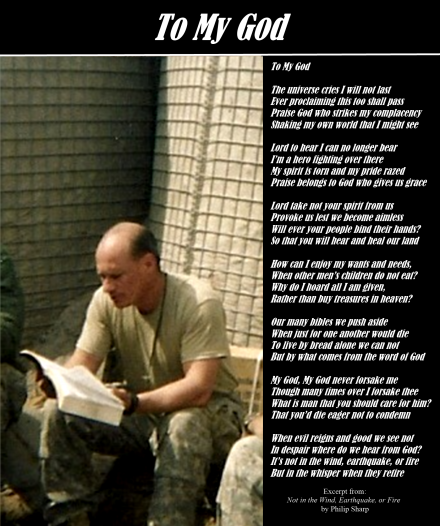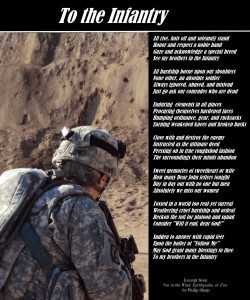Philip Sharp's Blog
February 27, 2013
Testimonial from a Respected Warrior.
Posted in Uncategorized
This testimonial is from Christopher Keeble. During the fight for the Falkland Islands in 1982 he served as the Executive Officer for the 2nd Battalion, The Parachute Regiment. He had to take over command for 2 Para at the Battle for Goose Green. His unit was grossly outnumbered and had a rough fight. Despite that 2 Para was able to compel the garrison to surrender. This victory though was gained at the cost of many casualties and the loss of their battalion commander. Two weeks later 2 Para would fight in the Battle for Wireless Ridge near Port Stanley. I have been well versed in the Falklands Campaign since I was a teenager. I have always had great respect for 2 Para and Mr. Keeble since. The opportunity to correspond with him has been an absolute honor and I greatly appreciate his comments for my book.
“Hello dear Philip.
Thank you so much for your message and now for the receipt of your book.
I have just spent an hour leaping around the text and marveling at your fortitude and courage, as well as the fellowship of those who formed your ‘Polar Bears’ team.
I resigned my commission in the UK Armed Forces, in part, because I ceased to be confident in my military and political leadership to engage in conflict within the just war criteria; especially as a Catholic. I admire the way in which you have been able to reconcile these contradictions.
Thank you so much for this truthful and brave account and I hope your experience, narrative and example will bring those you meet to Christ. You are a wonderful witness. I send my greetings too to your brave wife and family.
Please keep in touch.
God bless you”
October 28, 2012
What We Tend to Forget
Posted in blog
Yesterday I saw an Enlisted Service Record for a soldier in WWI. He was a miner from Montrose, WV who served in the artillery. He participated in a great number of battles to include the great Meuse-Argonne Offensive. The man has since past away and is hardly remembered anymore. The war itself is probably not remembered either. They called it the war to end all wars because that’s how destructive it was. They thought surely that we would not want to fight anymore wars after that. Wrong…just a few decades later a war of even greater destruction was waged. As I looked at this man’s service record (this is prior to the DD 214, it was issued by the Department of War) I thought on how no one recalls this guy or the war he was sent to. Already I feel that way with Iraq, and it is apparently the case in Afghanistan, and we are still there! It seems that we are always doomed to be forgotten along with our wars. This is one of the many reasons I wrote this book, in hopes that its memory would be recalled by someone-however few that may be.
On another note, I have also come to realize that I have been quoted by the Christian Examiner.
October 14, 2012
Testimony from a Brother in Arms.
Posted in blog
Recently I received a message from a fellow “Polar Bear”. We served together in the same Infantry battalion during the deployment during 2006 to 2007. He was a member of D Company, which was the smallest company, assigned to one of the toughest areas our battalion had. One dreadful early dark morning, an entire weapons platoon from D Company on Route Malibu in Karguli Village was eliminated and three of their soldiers were captured. We were never to see them alive again.
Dean Featheringill was assigned to this company and had just read my book, Not in the Wind, Earthquake, or Fire. He was pleased with the book and with the attention to detail which covered many aspects of our deployment. His mom read the book as well and loved it. I am so glad that I was able to capture so many things about this deployment on paper so that others can read about it get a glimpse into our lives then. Veterans are your biggest critics when it comes to talking about wars they have been in. It is good to get a favorable response for the work done in this book.
This is the message Dean sent me:
“Hi there. I was a D Co dude in ’06-07 and just wanted to say that I read your book and enjoyed it. You put some valuable insights about that time period down in writing and I appreciate your hard work in doing so.”
He followed up this message with another:
“I liked that you detailed some of the things that usually get left out and forgotten, like the universal anxiety and moodiness over when the next chance to use the phones/computers to contact loved ones back home again would be during those long stretches at the BPs and how silly selfishness in even totally non-combat scenarios can cause people to completely doubt their superiors. My Mom read the book and liked it and I’ve recommended it to a couple of D Co guys. Hope all is going well with you. Polar Bears!!!”
Thanks Dean for your comments. I am glad that both you and your mom loved the book!
October 10, 2012
Radio Interview With Hagmann and Hagmann
Posted in blog
Yesterday morning I drove into town to call in to the Hagmann and Hagmann show to ensure good phone reception. Ten O’clock rolls around, I call, and the show is not on the air. What happened!? I rechecked the time; it’s good. I rechecked the number; it is correct. The problem? I was early, too early, about 12 hours early! I was told 10 O’clock and assumed it to be 10:00 am instead of 10:00 pm. Oh how I miss Military Time!
Twelve hours later I made the trip again and successfully connected to the show. What I thought was to be a 30 minute interview ended up turning into an hour. The time passed without me making note of it and I don’t mind the extra time to talk. Douglas Hagmann, the primary host, loves to throw unscripted and pointed questions at you. I don’t mind that though. We live in a time where open questions and debate are needed more than ever. Using your offense to what someone says is a poor excuse to not reason with the point that was made. Cries of “You can’t say that”, or “Don’t be offensive” are merely debating tools to silence your opposition without having to answer their points. I believe most Americans have bought into this mind-set and turn their brains off with the slightest justification of offense. Yet we argue about the “Truth” or “Setting the Record Straight” as if there was an honest attempt at finding it. I was not prepared for some of Doug’s questions and some were beyond what I could honestly vouch for. However, I answered them with what I knew and with a free conscience. I’d have it no other way.
Overall I enjoyed the interview and loved talking with the Hagmanns. They expressed a curiosity which I honestly am not accustomed to from civilians. When the subject of the Iraq War comes up the usual response is a more reserved and stand-off demeanor with the usual and expected phrases. “Thank you for fighting for our freedom” or maybe, “Thank you for your sacrifice” are archetypical type expressions. Yet beyond that, there is no further inquiry into what the sacrifice or how the fight was. An awkward silence then follows and is usually broken by an abrupt change of the subject or an “Oh, look at the time” type gesture. After a while most veterans just don’t bring it up unless it is to someone they know who will relate.
There is one particular line of questioning that Doug used which I want to further expound upon here. In a conversation it is easy to miss certain things and I can better write it out using hindsight and a more thorough examination of the points made. I was asked if I thought US soldiers, and also if I would willing face off with their civilian counter-parts to suppress a movement against a tyrannical government (I am paraphrasing in my words…listen to the actual interview if you want to know the actual questions). I gave the opinion that some will and some will not; we are not all mindless robots. A reference was then quoted from my book were I talked about how it is amazing what years of conditioned obedience can do. I suppose they were trying to rectify that statement with the answer I made to their question, and rightfully so.
Army organizations, and worse, their governments have been around for a while and know how to use their forces. Conditioned obedience is a necessary ingredient for any army. Without it, there literally is no army worth that name. No one ever asks an army if they are willing to do such and such. In all the brief moments and rare historical examples that we have, any attempt to do so met with failure and a return to enforced authority. Surprisingly, though, this does not mean that ALL soldiers mindlessly obey without question every order given. It may surprise some of you that there are times when orders are ignored or disobeyed, even by leaders. The more the mistrust of the soldiers for their higher leaders, the more ramped this is. Yet the Army functions, how is this?
Here is my explanation of a typical approach that our Army uses in getting their soldiers to do things they expect won’t be received well. The first approach will consist in the “philosophical” appeal, the official reasons why we are to do it. This is intended to get those naturally motivated by the “noble” appeal to fall in with the mission, and there is always someone who will for each and every reason. Their motivation will be the most genuine and they will naturally influence many others to carry things out even if they are unsure of it. One example to come to my mind is the LA Riots in the early 90s. I was a Private at Fort Ord, CA when these broke out and some battalions of Infantry were sent to help keep order there. I was not in that battalion, but we were briefed about the events in case we were called upon. They didn’t tell us that US troops were being used to put down a rebellion or to enforce the government’s will, etc. That would not have gone over well. We were told that we were there to prevent the further spreading of violence and to prevent gangs from taking control of the city. To any reasonable soldier this sounds sufficient for them to do their duty.
This is only one example of active troops being used to keep order in our country. The first example that comes to my mind is the Whiskey Rebellion where Washington himself, as the President, led a large army to suppress it. More modern examples are the deployment of troops to the devastated areas of Hurricanes Hugo and Katrina. Throughout our history as a nation, like it or not, agree with it or not, there is precedent for the deployment of troops to keep law and order. It is not a newly invented idea. Americans traditionally do not like to subscribe to such a measure, but even democracies don’t tolerate rebellion and disorder.
What if this “philosophical” appeal does not have the desired effect? Then the Army will resort to enforcing it. In the not too distant past armies used flogging, hard confinement, and execution (among other rough measures) as means to ensure troop obedience. These are not common anymore in our Army, but the enforcement is still there. Threats and hampering of privileges are now common. It is made known that even though you do not like what is happening, you are still going to do it, or face the consequences. This by no means is appreciated and it causes a more disgruntled spirit within the ranks. Nonetheless, it has the desired effect of pushing the unit into its desired action. This is usually sufficient in mobilizing a sizable portion of the unit to act.
This must be viewed carefully though. Many soldiers executing orders that they despise do so grudgingly and with the most minimum of efforts. Often times the appearance of carry out the orders are made for the show, but in reality they are often not. Even still, the presence and half-hearted efforts of the soldiers gives the impression that they are willfully carrying out their despicable orders. This gives the commanders of forces and their political leaders a useful weapon in inspiring fear in their enemies. The downside of this is that such a force is subject to effective psychological warfare.
Consider Saddam’s army during the retaking of Kuwait in 1991. It was one of the largest armies in the world with combat experience from fighting a conventional war with Iran. They possessed tanks, aircraft, artillery, chemical weapons, and helicopter capabilities. On paper it was an impressive force and it answered unquestionably to the orders of Saddam. It is easy to condemn those soldiers from a distance for following Saddam’s orders, but those who do, do so in ignorance. Those soldiers endured what soldiers worldwide go through. They were coerced into action by its political and high ranking leaders. Honestly, that is what an army is for. To just fight such an army only, will help bind it together. When their friends are killed, when they country is devastated, and they have you to blame, it strengthens their resolve. Why did this not happen? We didn’t just fight that army, we appealed to its conscience. Many of their soldiers did not want to fight us for the sake of Saddam and this was played on heavily by us. Many surrendered rather than fought. This would repeat itself again in 2003 where Saddam lost control as his instrument of terror eroded.
Even with the coercion, you may still at times have soldiers who will not do a certain action no matter the consequences. What does an army do about this? They remove them. In our Army such soldiers are removed from the scene to keep them from having an influence on the rest of the body and to further try to convince the removed soldiers to recant and execute. Any influence they may have had is then minimized and usually a slandering campaign about those individuals will begin.
These are what I call the typical responses that the Army has in dealing with unattractive issues. It is unappealing and inglorious, but effective in getting the mission done. Worse, especially nowadays, the Army’s “apparent” ability to make anything work is used as a sort of proof to support political agendas. It does not matter if its ranks agree with it. It does not matter if it is practical or achievable. It does not matter if it puts a harder burden on our forces and hampers its war fighting abilities. What matters is the appearance of making questionable things work to use as a political proof to shove down someone else’s throat.
To sum up all of this, I restate that some soldiers will fight against civilians and some won’t. You just won’t know of the ones who don’t. Conditioned obedience will certainly leave it effects on the operation. In the end the Army will carry out the assigned tasks of its political masters, and rightfully so. Would you want such a force deciding for itself how to use such power? The focus then should be on the political leaders who would wield such a force. In our nation, that means the focus should be on the citizens who tolerate such leaders for their own selfish gains. Our nation was birthed with an ingrained desire to limit central political power for good reasons, reasons we have forgotten or trivialized.
You can listen to this interview on the Hagmann and Hagmann show at the following link: Talk Radio Interview
October 5, 2012
To My God
September 29, 2012
To the Infantry
Inteview and Reviews Too
Posted in Uncategorized
Today an interview was posted at A.F. Stewart’s Blog: Rants, Review, and Writing. This particular blog likes to focus on Indie authors specifically.
The latest review for the book on Amazon.com was an insightful evaluation. This is what he posted:
(Five Stars) Great Read
By Chris
“I very much enjoyed reading the book as it gave the reader a true insight into the inner workings of the life of a combat soldier in Iraq. It was great reading as Sharp was very detailed in his accouts of the day to day activities of he and his men. Sharp is obviously a very godly man that was an inspiration to his fellow soldiers as they faced the trials of being overseas in a hostile environment where death or dismemberment can occur at any moment. He makes you aware of the many facets of war that the non-soldier never even considers as we rely on what the media delivers via the evening news. It is apparent throughout the book that Sharp loves his family dearly and this, as well as his honor, integrity, character, and love of God and country, keep him focused on a calling far higher than his own desires. I’ll take him in my foxhole anytime.”
I have found on this journey of self publishing that it can be extremely difficult to get feedback and even more treacherous getting a review for your book. When one comes my way I am thankful to get it. It is not just because I want to hear that someone loves my book (yes, it does feel good), but it is also a way of verifying whether you had the desired effect on your readers. When you write for others, your ideas and thoughts make sense to yourself. However, there are times when your readers can read what you wrote and have a totally different reaction than what you had hoped for. Something that you feel is so full of depth and inspiration may not always encourage the same response in someone else. That is why I value feedback and reviews. It is like a guide, a compass, to direct how to better have the desired effect I would like to have for anyone who reads what I write.
I look forward to many other opportunities for interviews and some are in the works right now. The reviews, though, are what I crave the most I think. Am I on track with what I wanted to say? This is my chief concern. This has been a most interesting effort and I am learning almost daily so many things, especially marketing. In the end though, I hope that many will get this book into their hands to open their eyes to ignored, yet important, issues.
September 13, 2012
The Written Word and the Sound of My Voice
Posted in blog
The month of September, thus far, has been full of favorable prospects and some nail biting. A book give-away contest was concluded on Goodreads.com. The New Book Review posted a review of the book on their website. I also had an interview with Karl Monger, CEO of Gallant Few, on blog radio. Not in the Wind, Earthquake, Fire is a self-published work, so every facet that highlights the book further improves its exposure. This is a story with so many aspects: military, spiritual, philosophical, historical, veterans’ issues, etc. I feel it is a good solid book that many will find enlightening, entertaining, and challenging to the heart…if readers know about it. Independent authors have more difficulty placing their books on shelves in book stores primarily due to the expectation that you will buy back what does not sale. The books are printed on demand which means demand must be created prior to it being printed, not printed first to create the demand as is done with traditional printing houses. Therefore, when I get opportunities as these to showcase the book, I have reason to rejoice.
Goodreads is an excellent site for readers to research and share their love of book with others. A month long drawing was held and was finished on September 16th. A total of 339 readers entered the drawing for a copy of the book. Three lucky winners have had their personally signed copies sent to them. I hope they enjoy reading it and share it with others. In the near future there will be a Q&A session on Goodreads about Not in the Wind, Earthquake, or Fire where I will be answering questions and comments about the book. Look for it soon.
The New Book Review is blogged by Carolyn Howard-Johnson, author of the multi award-winning How to Do It Frugally series of books for writers. It was named to Online Universities’’ 101 Best Blogs for Readers. It is a free service offered to those who want to encourage the reading of books they love. That includes authors who want to share their favorite reviews, reviewers who’d like to see their reviews get more exposure, and readers who want to shout out praise of books they’ve read. Reviews and essays are indexed by genre, reviewer names, and review sites. A review for Not in the Wind, Earthquake, or Fire was posted on September 12th.
Gallant Few is a 501(c) 3 nonprofit organization that provides coaching, mentoring and training to transitioning veterans with a focus on the Special Operations veteran. Gallant Few also consults with corporations seeking to better understand and leverage the unique skills and abilities that veterans bring to their organizations. This is one of the charities that I contribute to from the profits of the royalties of this book. Every Wednesday at 3:00 CST they host a like radio talk show on blogtalkradio.com. Karl Monger, the host, is a former Army Ranger and a determined advocate for our nation’s veterans. I had the wonderful opportunity to be a guest on the show on September 12th. I was nervous though, especially knowing how my accent sounds over the phone. I could not get through on the number I was given since it was full of callers, so that only increased my panic. I did finally get through on an alternate number I heard and chimed in on the show just in time for the interview. You can still check out the show in its archives on that date. Here is that segment: Gallant Few Talk Radio September 12, 2012.
There are other events and opportunities that I am looking forward to in the future. There will soon be articles about the book in the Watertown Times near Fort Drum, NY, the Barbour County Democrat (Barbour County, WV), and the Inter-Mountain (Central WV). Within about a month I will be doing an interview on the radio station 91.3 at Alderson-Broaddus College and give a lecture on publishing. I also hope to secure a book signing and lecture at Loyola University in Chicago soon as well. On November 10th I plan to do a book signing and lecture at my local library as part of a Veteran’s Day event they are holding. It sounds full, but I wish for more opportunities, especially with charities that support veterans.
For those who have already acquired Not in the Wind, Earthquake, or Fire I hope you truly appreciate a story that was bought and paid for by so many. I hope you see the reality of life for our combat soldiers and see the hope we can have in God even in horrible circumstances. Be sure to tell others about it. Share your copy, share it on your social networking sites, and share your reviews on Amazon, Goodreads, etc. If you really enjoy the book, it is the best compliment you can give me.
August 26, 2012
First Book Signing Weekend
Posted in Uncategorized
The third weekend of August was a great weekend for me, though haunted by contemplation. I had the opportunity to do my first book signing and I got to relax in a wonderful cabin in Elkin, NC. The book signing was a lesson in patience with Divine providence and a matter of humility. The printer waited until the last possible second to ship the books out for the signing. I showed up with two copies and a prayer, waiting for the rest to arrive sometime (by the end of the day according to UPS). The books did arrive in time just before the most of the customers came-almost perfect timing. The humility was much deeper for me though. The owner of the book store recently (about a week ago) had her son get wounded while serving in Afghanistan. He lost both legs and is getting surgery to recover the use of one of his hands. This kind women poured out her heart and soul to me while I was there, trying to relate with her son through me. She told me that she read through some of my book but had to stop because the emotions from reading it reminded her about her son. Through her pain, she blamed no one and recounted the good in her life. On top of this she was adamant that what she would have earned be donated as well to the Wounded Warrior Project. In a strange way this book signing was some type of healing for her, and as she said it, “Philip helped me come down a few notches”. I didn’t know how or why, but she was comforted by me just being there. That really humbled me in what otherwise could have been a moment for pride to take off.

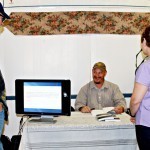
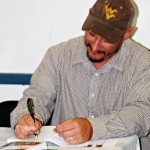
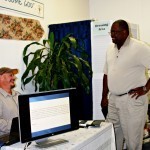
The weekend following the book signing was spent with family at a cabin in Elkin, NC. The first morning came pretty early for me. My son’s alarm wakes me…not him, in the early morning long before the sun rose. He had promised to help the son of our host to catch a miniature horse that they failed to get yesterday. My nudge woke him along with my stiff reminder that he needed to fulfill the promise he made. I was unable to go back to sleep so I sat out on the porch overlooking a pond. It was a peaceful morning calm with birds warming up their song, alongside the chorus of crickets, as the morning twilight advanced into sunrise. Memories filled my head. First the morning drizzle reminded me of a cadence we used to sing long ago called In the Early Morning Rain. “In the early morning rain, in the early morning rain, in the early morning rai..ai…ai…ain, no pain no gain.” Of course the best time to sing it was moments just like this when it rains and sucks outside. The setting reminded me of the many times of getting up too early and setting on a perimeter in the woods waiting for the sun to come up. In the Army, we called this “Stand To” and I have done more than I can possibly remember. “Stand To” is waking the entire patrol up before dawn, dressing for battle, and having the whole perimeter at 100% security before dawn. It is intended to be ready against an attack at that crucial time where if you’re not prepared, you could be at a disadvantage against an enemy who used the night to move onto your position. No one love “Stand To” and I was no fan myself. Yet today I reminisced about those moments and think about how much I missed them!
July 10, 2012
To The Infantry
Posted in blog
An excerpt from page 225-226
All rise, hats off and solemnly stand
Honor and respect a noble band
Gaze and acknowledge a special breed
See my brothers in the Infantry
All hardship borne upon our shoulders
None other, an absolute soldier
Always ignored, abused, and mislead
Just go ask our comrades who are dead
Enduring elements in all places
Procuring themselves hardened faces
Humping ordinance, gear, and rucksacks
Earning weakened knees and broken backs
Close with and destroy the enemy
Instructed as the ultimate deed
Pressing on in true roughshod fashion
The surroundings their minds abandon
Sweet memories of sweetheart or wife
How many Dear John letters tonight
Day in day out with no one but men
Absolutely we miss our women
Tossed in a world too real yet surreal
Weathering cruel hardship and ordeal
Reckon the toll for platoon and squad
Consider “Will it end dear God!”
Sudden to answer with rapid feet
Upon the holler of “Follow Me”
May God grant many blessings to thee
To my brothers in the Infantry

